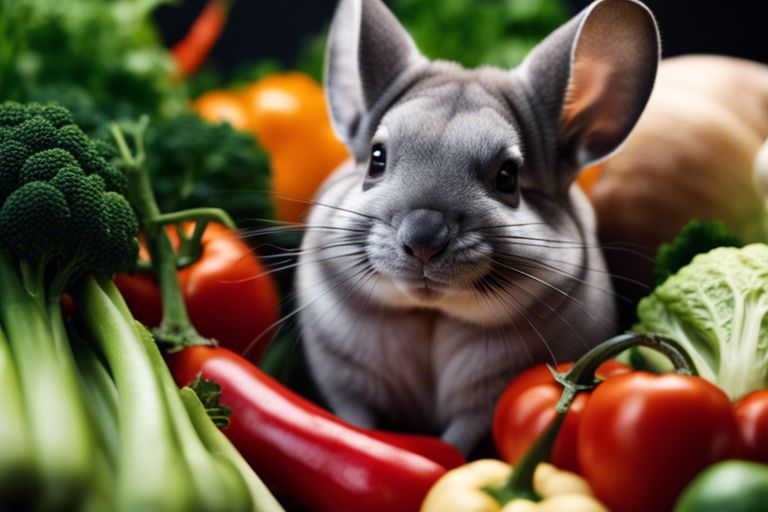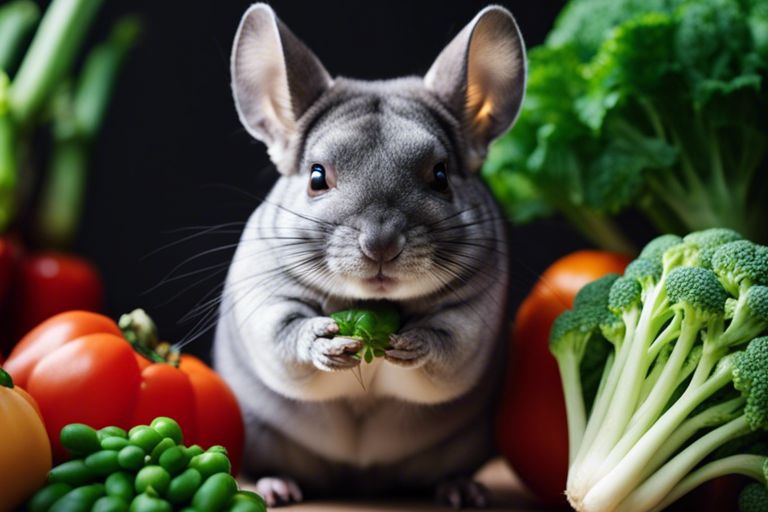Diet plays a crucial role in the overall health and well-being of chinchillas. Regarding their diet, vegetables can be a great addition to provide imperative nutrients and variety. However, not all vegetables are safe for chinchillas to consume. In this blog post, we will discuss the dos and don’ts of including vegetables in your chinchilla’s diet to ensure their optimal health and happiness.
Key Takeaways:
- Balance is key: Provide a variety of vegetables to ensure a well-rounded diet for your chinchilla.
- Avoid high-sugar and starchy vegetables: Limit or exclude vegetables like corn and potatoes to prevent health issues like obesity and digestive problems.
- Fresh and clean vegetables: Only offer fresh and washed vegetables to maintain the health of your chinchilla and prevent any harmful bacteria ingestion.
Essential Vegetables for Chinchillas
Recommended Leafy Greens
If you want to add some variety to your chinchilla’s diet, leafy greens are a great option. Vegetables like kale, dandelion greens, and cilantro are rich in vitamins and minerals that can benefit your pet’s overall health. These leafy greens also provide fiber, which is important for proper digestion in chinchillas.
Safe Non-Leafy Vegetables
An important aspect of feeding vegetables to your chinchilla is ensuring they are safe for consumption. While some vegetables are safe for chinchillas, others can be harmful. Carrots, bell peppers, and squash are examples of safe non-leafy vegetables that you can include in your chinchilla’s diet. Remember to introduce new vegetables gradually to avoid digestive issues.
With chinchillas, it’s important to pay attention to their diet to prevent any health complications. Some vegetables, like onions and tomatoes, are toxic to chinchillas and should be avoided at all costs. Always consult with a vet or exotic pet specialist before introducing new foods to your chinchilla’s diet.
Vegetables to Approach with Caution
High-Calcium Vegetables to Limit
Now, when it comes to high-calcium vegetables like spinach, beet greens, and Swiss chard, it’s important to limit these in your chinchilla’s diet. While calcium is necessary for bone health, too much of it can lead to urinary problems like bladder stones in chinchillas. These vegetables should be given sparingly to prevent calcium overload.
Vegetables That May Cause Digestive Issues
Now, some vegetables like broccoli, cauliflower, and cabbage may cause digestive issues in chinchillas. These vegetables are known to produce gas and can lead to bloating and discomfort in your pet. It is best to avoid feeding these vegetables or offer them in very small quantities to prevent any digestive disturbances.
Digestive issues can be serious for chinchillas and may require veterinary care if not addressed promptly. If you notice any signs of digestive distress such as decreased appetite, diarrhea, or unusual behaviors, it’s important to seek professional help immediately. Preventing these issues by being cautious about the vegetables you feed your chinchilla is key to keeping them healthy and happy.
Unsafe Vegetables for Chinchillas
Toxic Vegetables to Avoid
All chinchilla owners must be aware of the vegetables that are toxic and should never be fed to these delicate creatures. Among the top vegetables to avoid are onions, garlic, rhubarb, and avocado. These contain compounds that are harmful to chinchillas and can lead to serious health issues or even fatalities if ingested.
Common Vegetables Misconceptions
On the topic of chinchilla diets, there are some common misconceptions about vegetables that need to be cleared up. One of the most prevalent myths is that chinchillas can safely consume all types of greens. While vegetables are necessary for their diet, not all vegetables are safe for chinchillas to eat. It is crucial to research and only offer vegetables that are known to be safe for their consumption.
Toxic vegetables can have detrimental effects on a chinchilla’s digestive system, causing issues such as diarrhea, bloating, and even organ damage. It is vital for chinchilla owners to educate themselves on the appropriate diet for their pets and avoid feeding them any vegetables that could potentially harm their health.
Vegetable Diet Implementation
Frequency and Portion Size Guidelines
Keep in mind that vegetables should make up a significant portion of your chinchilla’s diet. Aim to provide fresh vegetables to your chinchilla daily, with around 1-2 tablespoons per day per chinchilla being a suitable portion size. Remember that moderation is key to prevent digestive issues.
Transitioning to a Vegetable-Inclusive Diet
To ensure a smooth transition to a vegetable-inclusive diet, introduce new vegetables gradually over a period of time. Start by offering small amounts of one vegetable at a time and observe how your chinchilla reacts. Avoid introducing high-sugar or high-moisture vegetables like carrots or lettuce too quickly as they can upset your chinchilla’s sensitive digestive system.
The key to successfully transitioning your chinchilla to a vegetable-inclusive diet is patience and observation. Monitor your chinchilla’s behavior and stool consistency closely during the transition period. If you notice any signs of digestive upset, such as diarrhea or a lack of appetite, immediately remove the new vegetable from their diet.

To wrap up
So, when it comes to a chinchilla’s diet, it is important to provide a balanced mix of vegetables to ensure their health and well-being. While there are some vegetables that are safe and beneficial for chinchillas to eat, there are others that should be avoided at all costs. By following the dos and don’ts outlined in this guide, you can help ensure that your chinchilla is getting the nutrients they need and avoiding any potential health risks. Recall, always consult with a veterinarian or chinchilla expert if you are unsure about a specific vegetable before feeding it to your furry friend.
